远大前程 阶级分析
远大前程赏析

远大前程赏析
《远大前程》是一部由卡尔·马克思和弗里德里希·恩格斯共同撰写的著作,该书于1848年首次出版。
这本书是马克思主义理论的
代表作之一,也是西方政治哲学史上的里程碑之一。
《远大前程》主要探讨了资本主义社会的矛盾和历史发展的规律。
书中提出了“阶级斗争”的概念,认为社会的发展是由阶级间的斗争推动的。
该书强调了工人阶级的历史作用,提出了“无产阶级革命”的思想,认为只有通过无产阶级的革命推翻资本主义制度,才能实现真正的平等和自由。
《远大前程》对于当今世界的政治、经济和社会发展仍有着重要的指导意义。
它提供了一种深刻的分析视角,帮助人们更好地理解当今世界的各种矛盾和困境。
同时,该书也启示我们,只有通过阶级斗争和无产阶级革命才能实现社会的真正进步和共同繁荣。
- 1 -。
远大前程观后感社会阶层与个人命运的抉择

远大前程观后感社会阶层与个人命运的抉择远大前程是一部由查尔斯·狄更斯所著的长篇小说,以其深入探讨社会的分层与个体命运的抉择而闻名于世。
读完这部小说,我深感其中所探讨的问题对于当代社会依然具有重要的意义。
小说中,主人公皮普(Pip)是一个智慧勤奋、渴望追求更好生活的孩子。
他出身贫寒,与姐姐在一个水边小屋中生活。
然而,一次偶然的遭遇改变了他的命运:皮普得到了一个神秘的资助者,该资助者提供了金钱和教育机会,让他能在伦敦远离贫困生活展开新的人生。
从此,皮普的社会地位得到了巨大提升,他进入了上流社会,沐浴在财富和地位的光环之中。
然而,皮普的这段艰难的成长历程也揭示了社会阶层与个人命运之间的复杂关系。
在追求更好生活的过程中,皮普逐渐忘记了自己家庭的温暖和真正的友谊,沉迷于虚荣和金钱。
他开始改变自己的外貌和习惯,追求上流社会所定义的“成功”。
然而,他付出的代价是与自己的根基和真正的自我疏离,内心的苦闷逐渐积累,最终导致他的人生陷入困境。
皮普的经历引发了我对于社会阶层与个人命运的思考。
社会阶层所带来的财富和地位的确可以改变一个人的生活,但同时也会造成个体的内心困扰和疏离感。
在现代社会,我们仍然可以看到许多人在追求上升社会阶层的过程中迷失了自我,付出巨大的心灵代价。
与此同时,小说中也有一些人物以及他们的抉择给予了我启示。
乔·盖吉斯(Joe Gargery)是一个朴实本真的农民,他不仅没有被物质诱惑迷惑,反而坚守着自己的价值观和道德准则。
他用自己真诚的友谊和温暖的家庭给予了皮普生活中真正的支持和安慰。
另外,小说中的两位资助者——马格旺和鲍尔斯——也给予了皮普宝贵的帮助,但他们的善意也受到了诸多限制和自身的不完善。
这些人物让我明白,在追求成功的过程中,我们应该坚守自己的内心,保持真实与善良。
综上所述,远大前程这部小说深入剖析了社会阶层与个人命运的抉择。
从皮普的故事中我们看到了社会地位的变迁所带来的机会与困境,也看到了个体内心的挣扎与回归。
《远大前程》中的社会晋升与道德堕落
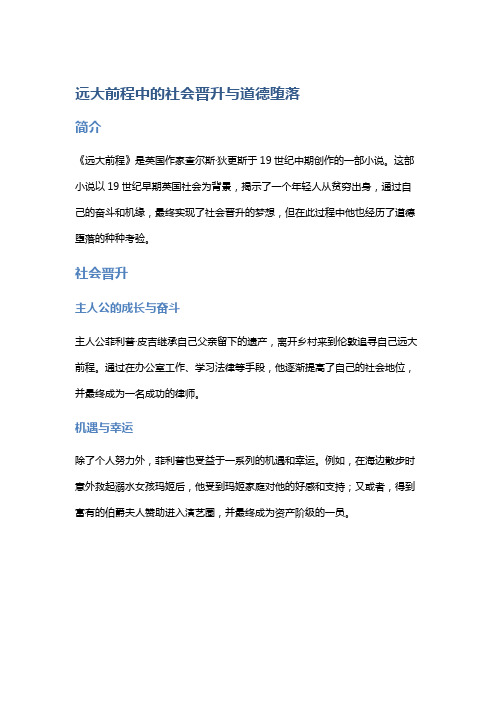
远大前程中的社会晋升与道德堕落简介《远大前程》是英国作家查尔斯·狄更斯于19世纪中期创作的一部小说。
这部小说以19世纪早期英国社会为背景,揭示了一个年轻人从贫穷出身,通过自己的奋斗和机缘,最终实现了社会晋升的梦想,但在此过程中他也经历了道德堕落的种种考验。
社会晋升主人公的成长与奋斗主人公菲利普·皮吉继承自己父亲留下的遗产,离开乡村来到伦敦追寻自己远大前程。
通过在办公室工作、学习法律等手段,他逐渐提高了自己的社会地位,并最终成为一名成功的律师。
机遇与幸运除了个人努力外,菲利普也受益于一系列的机遇和幸运。
例如,在海边散步时意外救起溺水女孩玛姬后,他受到玛姬家庭对他的好感和支持;又或者,得到富有的伯爵夫人赞助进入演艺圈,并最终成为资产阶级的一员。
道德堕落财富与诱惑随着社会地位和财富的增长,菲利普也面临了种种诱惑。
嫉妒、虚荣心、追求更高的社会地位等,这些因素都导致了他逐渐远离传统道德原则。
他开始放弃自己曾经守护的价值观,变得冷酷和无情。
爱情与背叛菲利普在追求财富和社会晋升的同时,也试图追求自己真正爱情的归属。
然而,在爱情中,他不仅背弃了曾经救过他命的玛姬,也对于真正爱他、关心他的女孩埃塞尔冷酷无情。
经历与教训最终,在经历了各种痛苦和困境后,菲利普意识到自己已经失去了自己最初纯洁善良的内心。
由于道德堕落所造成的亲友离散、内心的空虚和痛苦,让他认识到追逐社会晋升过程中所带来的价值观扭曲是不值得。
结论《远大前程》通过描绘主人公菲利普·皮吉的一生,展现了社会晋升与道德堕落之间的矛盾与冲突。
虽然通过努力实现了社会上的成功,但也因此走上了道德沦丧之路。
这部小说通过主人公菲利普的经历,警示人们要在实现个人远大目标的同时,始终坚守正义、良知和真实的自我。
文学名著《远大前程》:社会底层与上层之间的差距
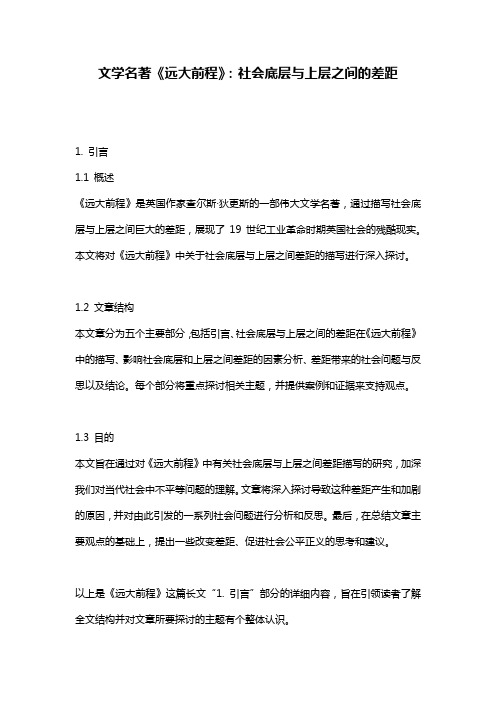
文学名著《远大前程》:社会底层与上层之间的差距1. 引言1.1 概述《远大前程》是英国作家查尔斯·狄更斯的一部伟大文学名著,通过描写社会底层与上层之间巨大的差距,展现了19世纪工业革命时期英国社会的残酷现实。
本文将对《远大前程》中关于社会底层与上层之间差距的描写进行深入探讨。
1.2 文章结构本文章分为五个主要部分,包括引言、社会底层与上层之间的差距在《远大前程》中的描写、影响社会底层和上层之间差距的因素分析、差距带来的社会问题与反思以及结论。
每个部分将重点探讨相关主题,并提供案例和证据来支持观点。
1.3 目的本文旨在通过对《远大前程》中有关社会底层与上层之间差距描写的研究,加深我们对当代社会中不平等问题的理解。
文章将深入探讨导致这种差距产生和加剧的原因,并对由此引发的一系列社会问题进行分析和反思。
最后,在总结文章主要观点的基础上,提出一些改变差距、促进社会公平正义的思考和建议。
以上是《远大前程》这篇长文“1. 引言”部分的详细内容,旨在引领读者了解全文结构并对文章所要探讨的主题有个整体认识。
2. 社会底层与上层之间的差距在《远大前程》中的描写2.1 背景介绍《远大前程》是英国作家查尔斯·狄更斯的一部经典长篇小说,出版于1860年。
小说以19世纪工业革命时期的伦敦为背景,生动地展示了当时社会底层与上层之间巨大的差距。
2.2 底层生活的描绘在《远大前程》中,作家通过主人公菲利普·皮普(Pip)这个身份低微的孤儿来揭示社会底层生活的艰辛。
他从小在恶劣环境下长大,贫穷和饥饿始终伴随着他。
他住在一个残破不堪、充满犯罪和堕落气息的企鹅岛村庄,在那里生活条件陋劣,社会秩序混乱。
作者通过对菲利普所处环境的描写,表现了低下阶层人们物质贫乏、缺乏机会以及压抑沉重的心理状态。
他们生活在肮脏拥挤的小屋中,被迫从事辛苦的体力劳动,日夜为生活而奔波。
菲利普的孤苦无依、缺乏教育和成长机会的遭遇,使读者对底层人民所面临的困境产生深刻共鸣。
《远大前程》:财富与阶级的追逐与反叛
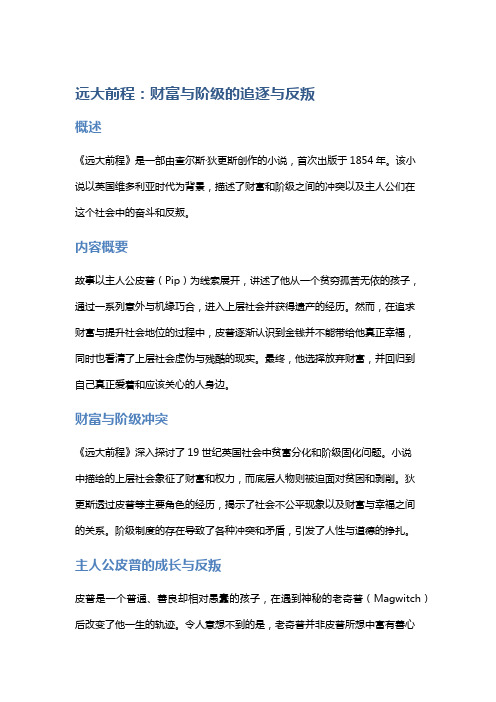
远大前程:财富与阶级的追逐与反叛概述《远大前程》是一部由查尔斯·狄更斯创作的小说,首次出版于1854年。
该小说以英国维多利亚时代为背景,描述了财富和阶级之间的冲突以及主人公们在这个社会中的奋斗和反叛。
内容概要故事以主人公皮普(Pip)为线索展开,讲述了他从一个贫穷孤苦无依的孩子,通过一系列意外与机缘巧合,进入上层社会并获得遗产的经历。
然而,在追求财富与提升社会地位的过程中,皮普逐渐认识到金钱并不能带给他真正幸福,同时也看清了上层社会虚伪与残酷的现实。
最终,他选择放弃财富,并回归到自己真正爱着和应该关心的人身边。
财富与阶级冲突《远大前程》深入探讨了19世纪英国社会中贫富分化和阶级固化问题。
小说中描绘的上层社会象征了财富和权力,而底层人物则被迫面对贫困和剥削。
狄更斯透过皮普等主要角色的经历,揭示了社会不公平现象以及财富与幸福之间的关系。
阶级制度的存在导致了各种冲突和矛盾,引发了人性与道德的挣扎。
主人公皮普的成长与反叛皮普是一个普通、善良却相对愚蠢的孩子,在遇到神秘的老奇普(Magwitch)后改变了他一生的轨迹。
令人意想不到的是,老奇普并非皮普所想中富有善心之人,而是一个逃亡囚犯。
尽管如此,老奇普给予了小男孩爱和金钱,并带领他走向上层社会。
然而,在远离家乡、接触到高尚世界中虚伪面纱后,皮普逐渐认识到金钱并不能购买真正的幸福,并意识到自己背叛了自己真正关心和珍视的人:乡村姑娘艾斯特拉(Estella)和养育自己的老姐夫乔·格尔吉斯(Joe Gargery)。
在真相浮出水面后,皮普决定与财富分手,并选择回到自己永远珍爱的人身边,展现了他的成长和内心的反叛。
反映社会问题狄更斯通过《远大前程》深刻反映了维多利亚时代英国社会面临的许多问题。
小说中描绘了曲折离奇却真实存在的社会环境、贫困、囚禁罪犯、剥削劳动者以及上层社会对底层人物的高傲与歧视等诸多问题。
通过揭示阶级固化、道德沦丧和虚伪等弊端,狄更斯呼唤着当时社会对于人性尊重、平等和正义的关注。
《远大前程》中的贫困与阶级固化
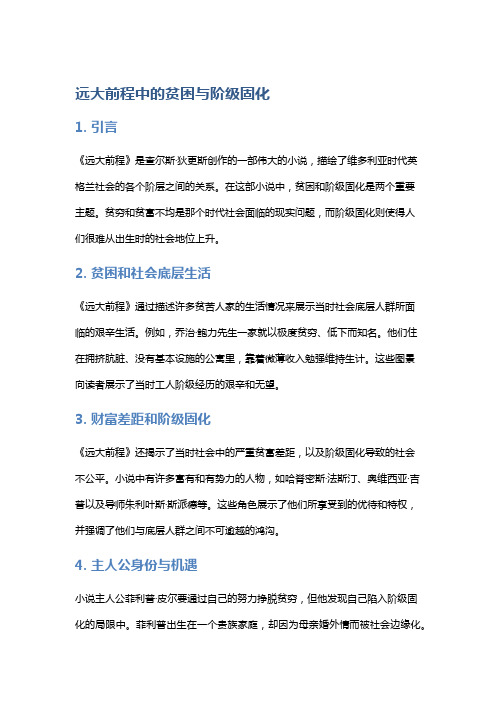
远大前程中的贫困与阶级固化1. 引言《远大前程》是查尔斯·狄更斯创作的一部伟大的小说,描绘了维多利亚时代英格兰社会的各个阶层之间的关系。
在这部小说中,贫困和阶级固化是两个重要主题。
贫穷和贫富不均是那个时代社会面临的现实问题,而阶级固化则使得人们很难从出生时的社会地位上升。
2. 贫困和社会底层生活《远大前程》通过描述许多贫苦人家的生活情况来展示当时社会底层人群所面临的艰辛生活。
例如,乔治·鲍力先生一家就以极度贫穷、低下而知名。
他们住在拥挤肮脏、没有基本设施的公寓里,靠着微薄收入勉强维持生计。
这些图景向读者展示了当时工人阶级经历的艰辛和无望。
3. 财富差距和阶级固化《远大前程》还揭示了当时社会中的严重贫富差距,以及阶级固化导致的社会不公平。
小说中有许多富有和有势力的人物,如哈脊密斯·法斯汀、奥维西亚·吉普以及导师朱利叶斯·斯派德等。
这些角色展示了他们所享受到的优待和特权,并强调了他们与底层人群之间不可逾越的鸿沟。
4. 主人公身份与机遇小说主人公菲利普·皮尔要通过自己的努力挣脱贫穷,但他发现自己陷入阶级固化的局限中。
菲利普出生在一个贵族家庭,却因为母亲婚外情而被社会边缘化。
尽管他天赋异禀、勤奋努力,在工作和学习上都取得优异成绩,但由于家世背景问题,仍然难以改变自己的处境。
5. 反思与启示《远大前程》通过展示贫困和阶级固化,引发了读者对当代社会问题的深思。
虽然该小说背景设定在19世纪英格兰,但其中揭示的社会不公和固化阶级问题在当代社会仍然存在。
它提醒我们要认识到财富不均和机会差距对社会平等造成的影响,并激励人们为实现更公平正义而努力奋斗。
6. 总结《远大前程》中的贫困与阶级固化是一个扣人心弦、引起读者共鸣的主题。
通过描绘底层人群生活和主人公的经历,该小说呈现了一个真实而残酷的社会环境。
同时,这也是对当代社会中贫富差距和阶级隔离问题的深刻反思。
我们有责任以此为警示,共同努力为构建一个更加平等与公正的社会而奋斗。
《远大前程》:阶级、抱负与现实的距离
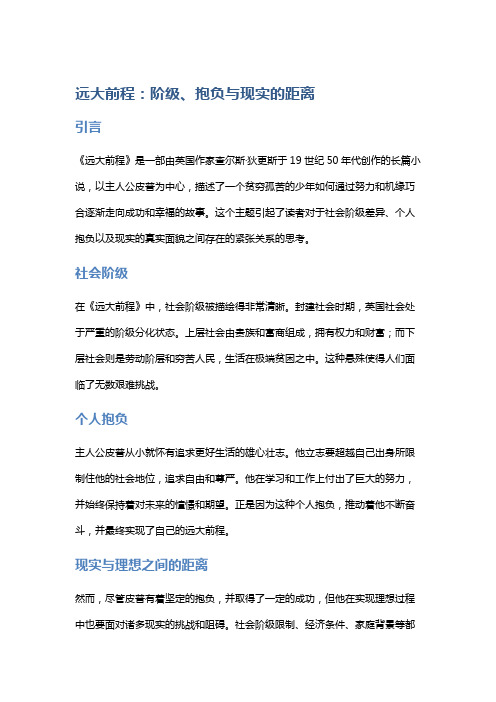
远大前程:阶级、抱负与现实的距离引言《远大前程》是一部由英国作家查尔斯·狄更斯于19世纪50年代创作的长篇小说,以主人公皮普为中心,描述了一个贫穷孤苦的少年如何通过努力和机缘巧合逐渐走向成功和幸福的故事。
这个主题引起了读者对于社会阶级差异、个人抱负以及现实的真实面貌之间存在的紧张关系的思考。
社会阶级在《远大前程》中,社会阶级被描绘得非常清晰。
封建社会时期,英国社会处于严重的阶级分化状态。
上层社会由贵族和富商组成,拥有权力和财富;而下层社会则是劳动阶层和穷苦人民,生活在极端贫困之中。
这种悬殊使得人们面临了无数艰难挑战。
个人抱负主人公皮普从小就怀有追求更好生活的雄心壮志。
他立志要超越自己出身所限制住他的社会地位,追求自由和尊严。
他在学习和工作上付出了巨大的努力,并始终保持着对未来的憧憬和期望。
正是因为这种个人抱负,推动着他不断奋斗,并最终实现了自己的远大前程。
现实与理想之间的距离然而,尽管皮普有着坚定的抱负,并取得了一定的成功,但他在实现理想过程中也要面对诸多现实的挑战和阻碍。
社会阶级限制、经济条件、家庭背景等都成为他远大前程道路上的绊脚石。
这让我们进一步思考现实与理想之间存在的紧张关系——即使一个人有着追求卓越的愿望,但是否能真正脱离社会条件束缚而达到自己心中期望中更好的生活?结论《远大前程》以其深入探讨了阶级、个人抱负和现实之间复杂关系而闻名于世。
它向我们展示了主人公皮普通过勤奋和坚持不懈所取得的成功,并提醒我们在现实中,我们的抱负和目标可能面临着各种挑战。
然而,这部小说也鼓励我们坚持自己的理想,并通过自己的努力和勇气逐渐缩小阶级、抱负和现实之间的距离,最终实现远大前程。
《远大前程》读书笔记

《远大前程》读书笔记概述《远大前程》是英国作家查尔斯·狄更斯创作的一部长篇小说,首次于1850-1851年以连载形式在《康纳斯杂志》上发表。
该小说以19世纪英国社会中的阶级冲突和社会不公为背景,通过主人公皮普·派普的成长经历,展现了一个普通人奋斗追求自由、正义和追求幸福的故事。
本篇读书笔记将从主要人物、情节分析和主题探讨三个方面对《远大前程》进行总结和分析。
主要人物皮普·派普皮普·派普是本书的主人公,也是一个极具魅力的角色。
他在书中从一个普通的孤儿成长为一位绅士。
身世的变迁以及与人物之间的复杂情感关系让他经历了许多磨难,但皮普·派普始终保持着坚定的品格和善良的心灵。
他的成长过程也展现出自信、勇气、真诚和努力的重要性。
寇比特寇比特是一个古怪、离奇的人物,也是皮普·派普的忠实朋友。
在皮普·派普最艰难的时刻,寇比特一直给予他支持和鼓励。
虽然经历了种种困难,但寇比特在整个故事中始终保持着幽默和乐观的态度,为皮普·派普提供了一种宝贵的友谊。
艾斯特拉是皮普·派普的心上人,她是一位美丽而受人喜欢的小姐。
尽管初次见面时,艾斯特拉对皮普·派普并不感兴趣,但随着故事的发展,她渐渐对皮普·派普产生了情感。
艾斯特拉的爱情观和家庭背景与皮普·派普形成了鲜明的对比,成为小说中的一个重要形象。
情节分析孤儿时期皮普·派普在小说的开始阶段被描绘成一个孤儿,住在一个穷困的家庭中。
他的童年是在困苦与饥饿中度过的,但他内心深处一直保持着一份自强不息的精神。
遇见寇比特在一个风雪交加的晚上,皮普·派普遇到了一个“流浪汉”寇比特。
寇比特成为了皮普·派普从孤儿到绅士的转折点。
他给了皮普·派普勇气和力量,让他相信自己可以改变命运。
从乞讨少年到律师皮普·派普进入了一个律师事务所开始了他的职业生涯。
- 1、下载文档前请自行甄别文档内容的完整性,平台不提供额外的编辑、内容补充、找答案等附加服务。
- 2、"仅部分预览"的文档,不可在线预览部分如存在完整性等问题,可反馈申请退款(可完整预览的文档不适用该条件!)。
- 3、如文档侵犯您的权益,请联系客服反馈,我们会尽快为您处理(人工客服工作时间:9:00-18:30)。
Social class played a major role in the society depicted in Charles Dickens's Great Expectations. Social class determined the manner in which a person was treated and their access to education. Yet, social class did not define the character of the individual.Many characters were treated differently because of their social class in Great Expectations. Seeing the contrast between how the poor and the rich were treated will give a clearer understanding of how much social class mattered. In chapter 27 when Joe comes to see Pip, he treats Joe in a different manner than before because Joe was now in a lower social class. His feelings about Joe's arrival were "Not with pleasure... I had the sharpest sensitiveness as to his being seen by Drummle." (p. 203). He was afraid that Drummle will look down on him because of Joe's lower class. Not only does Pip treat Joe differently, Joe also treats Pip differently because of their difference in social class. He begins to call Pip "sir" which bothered him because "sir" was the title given to people of higher class. Pip felt that they were still good friends and that they should treat each other as equals. Joe soon leaves and explains his early parting, "Pip, dear old chap, life is made of ever so many partings welded together, as I may say, and one man's a blacksmith, and one's a whitesmith, and one's a goldsmith, and one's a coppersmith. Diwisions among such must come...." (p. 209). He creates this metaphor than he is a common blacksmith and Pip is a goldsmith. This difference in social class had brought upon their separation. Other characters that were also judged by their social class were Magwitch and Compeyson. They were both on trial for the same crime but Compeyson got off easier than Magwitch because of his higher social class. Magwitch describes Compeyson's defense speech, ."..here you has afore you, side by side, two persons as your eyes can separate wide; one, the younger, well brought up... one; the elder, ill brought up... which is the worst one?" (p. 325). The decision of the trial was solely based upon social class appearance. These cases show how much social class really mattered.In Great Expectations, a person's social class determined the amount of education they had. It is important to perceive this relationship between education and social class to clearly understand the importance of social class. A person like Joe who was a common blacksmith had no education at all. Pip, in the early days when he was low class, had a poor education at a small school. The school was not the best of schools, but it's all that the lower class had. The teacher spent more time sleeping than teaching and Pip had learned more from Biddy than from the actual teacher. Even though he had an education when he was low class, his education as a gentleman with Mr. Pocket was much greater. Another example of how social class affects education is the difference of education between the two convicts. Magwitch, born poor and low class had no education at all while Compeyson, born rich was high class and a gentleman with an education. Education is a factor in showing how social class greatly determined people's lives.Even though social class determined many things, it did not establish a person's true innercharacter. Realizing this will play a part in proving that social class did matter in most but not all cases. For example, the lowest class people were Joe, Biddy, Magwitch, and Orlick. Joe and Biddy were very poor but had very good hearts. Joe was always there for Pip and Biddy had moved in to help Mrs. Joe. Magwitch was a dirty convict of the lowest class, but he turned out to be a very caring and generous man. Orlick was low class and his character also turned out to be very low because he was a murderer. The fact that there are both good and cold hearted people in the lower class shows that class has no connection with how people really are. Another example is the richer class. This includes Ms. Havisham, Estella, Herbert, Jaggers, and Wemmick. Ms. Havisham and Estella were both very wealthy but they had no heart and their intentions were to bring hell to all men. While Herbert was the opposite, he was a true friend to Pip and always stayed by his side. Jaggers and Wemmick also in the higher class had supported Pip through his gentleman years. Being aware that not all of the high class were necessarily good people states the fact that class does not determine character. Even though class mattered in most things, this is an example it did not take part in.After exploring how class was associated with the way people were treated, how much education they had, but not with their true character, these facts have become easy to discern. With these points proved, the fact that social class mattered in most but not all things had no doubt become clear in the mind. It is strange how different social class had been back in Pip's days and now. Where will social class lead next?Dickens' personal experiences growing up obviously play a large part in his novel Great Expectations. Seeing his own father sent to debtor's prison and witnessing firsthand his loss of status clearly sharpened his own sense of the differences in class in England. His novel exemplifies the Victorian desire for upward mobility and their fantasy that anyone can rise to higher social status if only they can receive some secret wealth. In the novel, those who work hard and are good at heart end up with situations much improved by the end of the novel (Joe, Wemmick, Herbert, Matthew Pocket, etc...). Conversely, those who are wicked or take advantage of others tend to experience negative consequences, up to and including death (Compeyson, Drummle, Orlick, etc...). The possibility for redemption exists, but a character has to realize the error of their ways before it can be granted (Estella, Miss Havisham, and Pip himself).Pip's personal journey of realization forms the center of the novel. Throughout the story, Pip is exposed to all levels of the class spectrum. His journey takes him from poor blacksmith's apprentice, to the aristocratic realm of Miss Havisham, into the world of amiddle-class London gentleman, back to his humble beginnings, and finally to a prosperous life abroad. Along his journey, he learns a valuable lesson about his own prejudices and harsh judgments of those close to him. While Pip clearly comes to realize the folly of his own prejudice, there is no indication in the novel that he learns a lesson about the injustices of the class system as a whole. Pip seems completely absorbed in the microcosm of his own companions, and never expands his new-found awareness to the larger level.In the beginning, Pip is a caring, thoughtful boy who is largely ignorant of the larger world of class in which he lives. In his innocence, he honestly wishes to help the starving convict he finds in the marshes despite threats against his life. He feels bad for robbing his own house and for the necessity of lying to his sister despite her tyranny over him. It's only when he's introduced to Estella that his sense of class distinction begins to develop. In his naiveté he takes every word she says as fact. He is depressed by the realization that he is "common" and "coarse" and that all those he loves apparently unknowingly possess the same faults. Pip begins to believe that higher status, manners, and wealth are synonymous with one's value as a person. When news of his "expectations" arrives, his ego swells considerably almost immediately. He's sure that his "selection" is a sign of his great personal worth and it makes all the "common" people with which he's always associated seem beneath him. The change in attitude of those in the town toward him only reinforce this, and by the time he's ready to leave his village he wishes to walk to the coach without Joe because he's afraid of the stark contrast between them. While his attitude has definitely changed because of his awareness of class difference, he never seems to expand this belief beyond the circle of people he's already familiar with. He believes he's better than those in his village, but he never extrapolates that belief into a larger context.When he arrives in London, Pip is promptly reunited with Herbert Pocket. Herbert serves as his major role model of a gentleman, and consequently Pip strives to emulate him. Herbert and his father seem to be genuinely good people. Herbert passes on his father's philosophy of gentility which includes refinement of emotion and a good heart. Pip believes that by simply emulating Herbert's behavior he can become a "good" person like him. He initially fails to learn the larger lesson of Herbert's words and instead concentrates on learning manners and increasing his education, thinking that simply acting like a gentleman is all it takes to be a decent person.Pip is an incredibly selfish figure throughout most of the novel. His priorities are clearly misaligned. He wants to learn to be a gentleman because being a gentleman makes him a good person, but he fails to capitalize on seemingly-obvious opportunities to help out those close to him. Pip finds himself in London in a greatly-improved financial situation, he seeks ways to improve his own personal decency through manners and refinement, yet he never spares a thought for the good he could do for his afflicted sister with just a small portion of his income. Just a few pounds would seem a fortune to his sister and Joe, and he never gives them a second thought, concentrating only on himself and those he sees as being more worthwhile. It's as if the residents of his village no longer exist to him. It's this fierce selfishness that never allows him to awaken to the larger problems of class in which he's immersed.It's only when the true source of Pip's upward mobility is revealed that he begins to question his perceptions. When Magwitch is revealed as Pip's benefactor, all his preconceptions about his "selection" and his destiny with Estella are shattered. Instead of having been recognized by an upper-class individual as a truly worthy person, he's been the instrument of a convict's retribution against society. That night, after he's able to ponder his situation, he finally begins to realize the horrible way he's treated Joe. It's only then that he can begin to realign his idea of what makes a person valuable. However, he again spares no thought for the countless other members of the lower class who have undoubtedly been wronged by others just as he has wronged Joe.Eventually, Pip is able to forgive Miss Havisham for her deceptions and his own misfortune. He refuses her offer to financially compensate him and instead suggests she support Herbert's business endeavors. This generous deed comes back to save him by the end of the novel, when he ends up working for the firm his and Miss Havisham's money helped support.Further loosening of his false beliefs in class determining personal worth is evident in his treatment of Magwitch. Initially he views Magwitch as little more than an uncivilized animal. Eventually Pip's feelings toward Magwitch soften to a kind of loving gratitude. He begins to see that a man can be essentially good despite a rough exterior. Pip puts himself through great personal risk and inconvenience in his quest to save Magwitch. Though he fails to get him out of the city, Pip's care of and devotion to Magwitch up until his eventual death is unwavering, even after Pip learns that he will no longer be receiving any of Magwitch's money.The true measure of Pip's journey is the fact that by the end of the novel he can actually feel affection for the convict he viewed as little more than an animal for much of the story. However, despite the fact that he's realized the folly of his own misconceptions regarding those close to him, we never see him view this knowledge as belonging in a larger context. He learns the value of hard work and spiritual earnestness, and his good deeds bring him positive returns, but his realizations do not seem to lead him to an understanding of the fullest impact of class prejudice.Allegorically, Dickens does seem to intend that the reader discern something about the larger context in which Pip's story takes place. The characters within the novel clearly represent the different social levels of England's class society and their actions exemplify the ways in which those classes interact. Pip as a character, however, never comes to see his own experience as indicative of problems on a larger scale.。
